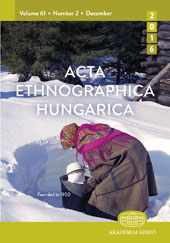Body – Identity – Society: Concepts of the Socially Accepted Body in the 20th Century in Hungarian Rural Areas
Body – Identity – Society: Concepts of the Socially Accepted Body in the 20th Century in Hungarian Rural Areas
Author(s): Katalin JuhászSubject(s): Social history, Culture and social structure , Social psychology and group interaction, Social development, Rural and urban sociology
Published by: Akadémiai Kiadó
Keywords: Body; hygiene; cleanliness; hungarian traditional culture; urbanization; social structure;
Summary/Abstract: Wide-ranging research has shown that cleanliness is both a social and a historical construct, that is, a relative rather than an absolute concept. The rather complex social and psychological context and causes of cleansing change with time and space. The social change characterized by modernization and urbanization in the first half of the 20th century had a profound effect on the mentality, way of life and social behavior of Hungarian peasantry as well, including the meaning of cleanliness and related customs. The aim of the paper is to analyze the practices and customs related to washing and bathing and their modification triggered by socio-economic and political change. The first part of the article gives a brief clarification of the terms “cleanliness” and “hygiene,” surveys Hungarian and international research on the topic, and presents a brief history of cleansing as a universal custom. In the second part, the author outlines a socio-historical model of the major stages of change in Hungarian village habits of cleanliness based on extensive field experience.
Journal: Acta Ethnographica Hungarica
- Issue Year: 61/2016
- Issue No: 2
- Page Range: 283-312
- Page Count: 30
- Language: English
- Content File-PDF

